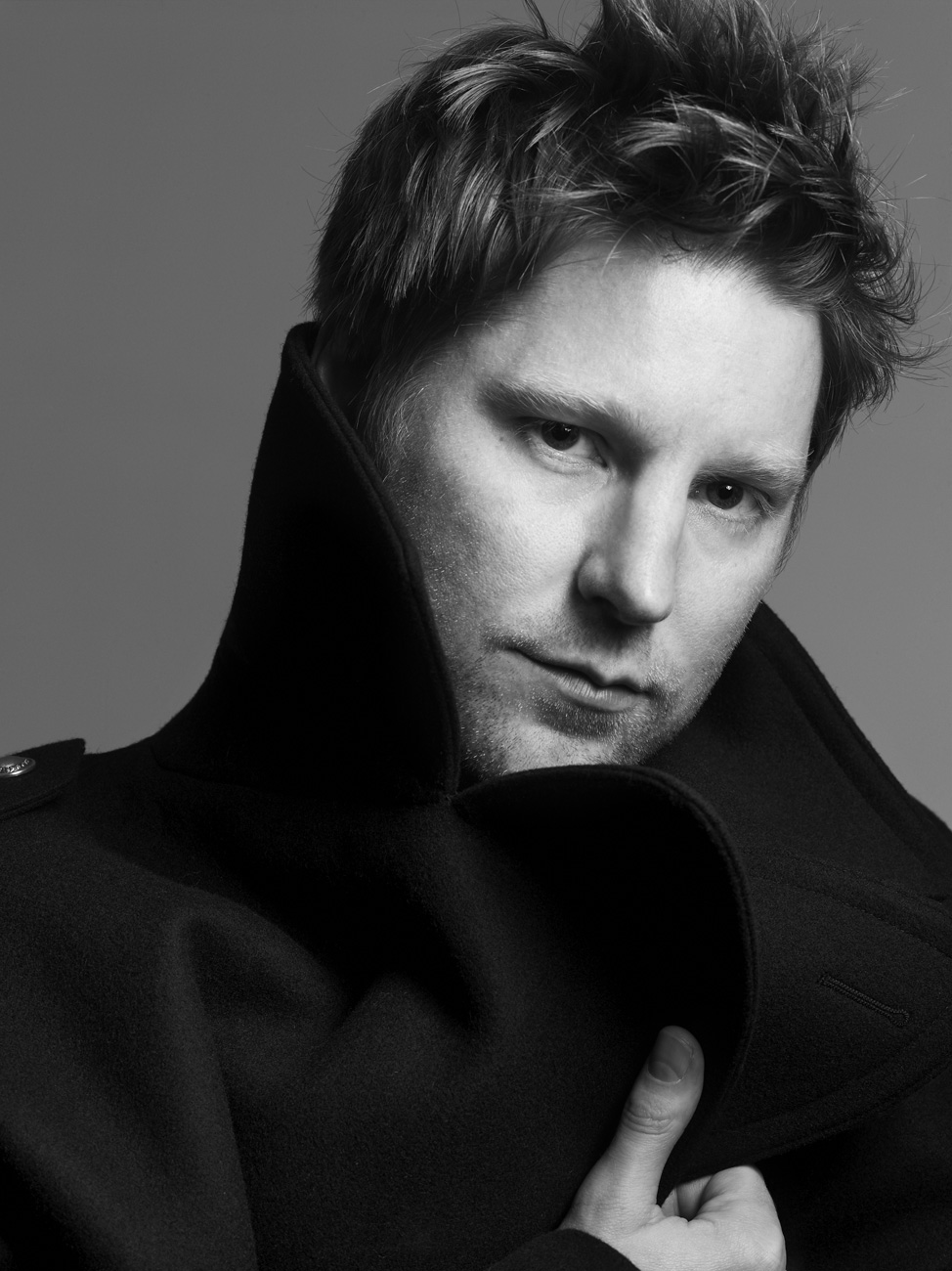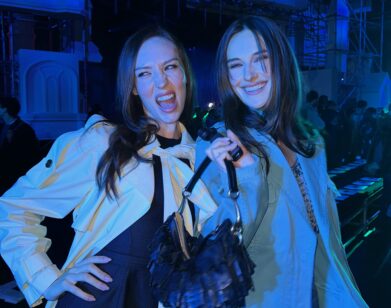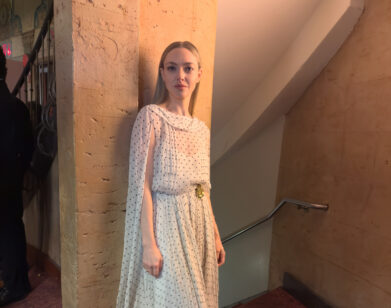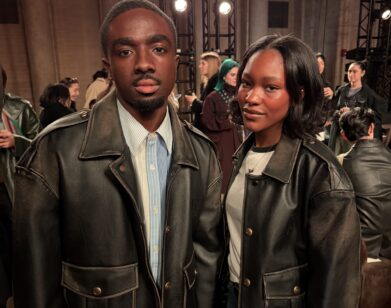Christopher Bailey
I live with my eyes open. I never try to force myself to be inspired. I’m not someone who feels that they have to go to a foreign country or another culture to look for inspiration.Christopher Bailey
Over the past 12 months, Christopher Bailey has been collecting awards. In December 2009, Baileywon Designer of the Year at the British Fashion Awards—his second win in four years—and, last June in New York, he was bestowed with the highly coveted International Award by the Council of Fashion Designers of America. In fact, Bailey’s rise to the top of the fashion world after taking over the reins at Burberry in 2001 and turning the ultimate British luxury house into a brand that could conceivably be worn by both a Wall Street father and his rebellious rock ’n’ roll children, has been so expeditious and complete that it’s hard to believe he is only 39 years old. Bailey, who was famously discovered by Donna Karan while he was still studying fashion at the Royal College of Art (and went on to work for her for two years after), seems to have hit on the formula for revolutionizing a house without alienating its core enthusiasts. He has mined the Burberry tradition, particularly its signature tartan, and yet resisted his right to twist, invert, and even break free from it. This fall, his collections reconfigured outerwear as sexy indoor necessities. With women’s, men’s, and accessories collections, and fragrances already under his belt, this summer he is introducing the brand’s first line of makeup, Burberry Beauty. With all of that designing, it’s difficult to see how he has managed to find the time to dig his heels into the London music scene with the intensity he has. When he got on the phone with his friend and the face of Burberry, the model-turned-actress Rosie Huntington-Whiteley, it was midnight Los Angeles time for her, which meant it was 9 a.m. in Milan—a few very short hours from the presentation of his spring-summer 2011 Burberry Prorsum menswear show.
CHRISTOPHER BAILEY: I can’t believe it’s midnight in L.A. I’m so sorry that you’re up so late doing this.
HUNTINGTON-WHITELEY: No, I’m so happy to. You know, shooting the Burberry campaign [Fall 2008] was a real turning point in my career. What do you look for in an iconic Burberry girl? Is there any women particularly inspiring you right now?
BAILEY: Obviously, for me, that person has got to have a beauty to them—and it’s not always physical beauty. It’s important that I love someone’s character and that I click with it. We meet so many people, and it’s interesting when you meet someone who you really connect with. They have their own energy, their own personality, and that is something so different than just beauty. So that really drives the decision for who to work with on a campaign.
HUNTINGTON-WHITELEY: What inspired you as a child to be a designer? Was it something you always wanted to do?
BAILEY: I really didn’t know that this kind of fashion even existed when I was a child in Yorkshire, England. My dad is a carpenter, a joiner, and I used to watch him make things. So I always imagined that I’d do something where I made things, too. I was really more interested in architecture growing up because I would work with my dad on houses. So fashion was, in a way, an accident. But this world opens you up to a lot of different avenues that interested me. I loved the idea of working in different countries. And I loved the idea of construction and working with imagery. But, yes, I fell into fashion a bit by mistake.
HUNTINGTON-WHITELEY: I feel the same way. I had no idea about fashion growing up. I mean, I used to flick through Vogue and watch The Clothes Show [a British news and entertainment series covering the fashion world that ran on the BBC from 1986–2000] . . .
BAILEY: The Clothes Show! Completely! Those were literally my two reference points in fashion as well. I didn’t really know that there was a whole industry behind it and how it operated.
HUNTINGTON-WHITELEY: Congratulations, by the way, on winning the CFDA award. You’ve won a lot of awards since you joined Burberry in 2001. Which one has meant the most to you?
BAILEY: It’s brilliant to get recognition. The CFDA was magic because it’s such a big award in our industry. There’s nothing more flattering than being honored by your peers. The British Fashion Awards are also very important because it’s my hometown. But it’s really a recognition of my team, and those awards give me an opportunity to thank them in a formal way. You and I have worked together enough to know that it really isn’t about two people. It’s a whole team. And so it’s great to acknowledge that you never do anything alone.
HUNTINGTON-WHITELEY: But the one thing I’m always amazed about is how hands-on you are with everything under the Burberry umbrella. You design all the collections—both menswear and womenswear—and you really have a voice in the branding of the label. You said you were interested in architecture as a kid—and you designed the entire Burberry building on Horseferry Road. How do you handle it all?
BAILEY: I’m fairly organized. I’m quite good at compartmentalizing things. I can go from a meeting to working on a building and then designing a fragrance and then working on a collection. You can do that when you build an amazing team. I’ve always loved working with people. It’s really not about ego—it’s about creating something we can be really proud of.
I’ve met so many incredible bands, and I love acoustic music—especially the rawness of it. So I asked a lot of these bands if they’d do an acoustic live set . . . It’s like what I was saying, when you meet people, it takes you on a journey.Christopher Bailey
HUNTINGTON-WHITELEY: There is definitely a feeling of family at Burberry.
BAILEY: Yeah, we’re really close. I don’t like that idea of working with somebody one season and then it’s over. To me that feels somewhat superficial. If you connect with someone and get close, it’s weird to say, “Okay, there’s one project that we are working on and that’s it.” So for me it’s always been about building relationships and having loyalty. Because the exciting thing is that everyone goes through different experiences in life and it’s great if you can keep working together through all of that.
HUNTINGTON-WHITELEY: And now you’re even putting out a makeup line this summer. I guess that’s an organic move, since you already have the fragrance.
BAILEY: It was one of the only things I felt was missing whenever we were working on a show or a shoot. When we’d be talking about the look of the Burberry Girl, I found it really difficult to describe the natural makeup I wanted, which wasn’t plastered on and two-inches thick. The idea for this line was much more natural and relaxed. There is still a lot of old-fashioned romanticism about makeup—like a big face of cake all over you. So I developed this line from the attitude of what modern makeup is. I liked the idea of it being easy and elegant rather than something that was such hard work to apply. It took about two years to put it all in motion. It was a big project.
HUNTINGTON-WHITELEY: I like to feel like I’m not wearing any makeup. I personally don’t like a compliment that goes, “Oh, your makeup looks great.” Makeup should really bring out what you already have.
BAILEY: That was exactly the philosophy behind it: to make the best of you rather than reinvent you. I feel the same way about clothes as well. You should be wearing them as part of your character, not the clothes screaming first.
HUNTINGTON-WHITELEY: I’ve always marveled at how designers have to turn out collections season after season. Do you ever hit a wall and go, “Oh, my god, I have writer’s block. I can’t think what to do”?
BAILEY: I live with my eyes open. I never try to force myself to be inspired. I’m not someone who feels that they have to go to a foreign country or another culture to look for inspiration. Without sounding like a ponce, I think life is such a journey that you’re kind of discovering things the whole time. When you’re conscious of that and you don’t take it for granted, and when you meet new people and see beautiful things and get to travel the way we do in this industry, you can be constantly inspired. The trick is to recognize that and keep a little bank of impressions in your head. And who knows when they are going to pop out for you. But I never look for inspiration. When you start to say, “Okay, now I’ve got to think of something for the next collection,” it never works. You end up being blocked.
HUNTINGTON-WHITELEY: I know you are very much into film and music. Some of the boys in the last campaign were musicians [George Craig, Matt Gilmour]. What is some of your favorite music that has inspired you?
BAILEY: There are so many different ones. I do a lot of research online. It’s almost like a massive mood board. You discover new musicians there, new artists, new actors. But again, we’re lucky we are in an environment where you are constantly meeting new people. For example, I heard the music of Rory [Cottam] from The Cheek online and we met and ended up talking about his music.
HUNTINGTON-WHITELEY: He’s such a nice boy.
BAILEY: Oh, so nice. In fact, I’m seeing him later on. And then there’s George Craig from One Night Only. He’s from Yorkshire, so we kind of connected immediately. And when I first meet a lot of these people it has nothing to do with the campaign. It’s more like, “Let’s work on something together—who knows what it’s going to be.” We’ve just launched something called Burberry Acoustic. For the 10 years I’ve been at Burberry I’ve met so many incredible bands, and I love acoustic music—especially the rawness of it. So I asked a lot of these bands if they’d do an acoustic live set. It’s a big digital project I’ve been working on and we’ve just put it up online. It’s a bank of really incredible new British talent. So it’s like what I was saying, when you meet people, it takes you on a journey.
HUNTINGTON-WHITELEY: It’s all about meeting people. I find that you should always take a meeting. Who knows what will happen. Mario [Testino] has been shooting your campaigns for 10 years now. Obviously he’s a great photographer, but he also has great energy. Everybody loves to work with him. What makes you keep coming back to him instead of switching up other photographers?
BAILEY: I adore Mario. And it’s a loyalty thing. When you’re loyal to somebody, you have a real mutual respect. And with that respect comes freedom and being open to talk very honestly with each other. That’s what Mario and I do all the time. We e-mail and speak and that’s how we evolve the campaigns. Usually the night or day after the show, Mario and I will go for breakfast and we’ll just talk about the mood and energy of the show and how we might incorporate that into a campaign. It’s a very open dialogue.
HUNTINGTON-WHITELEY: I also didn’t realize that you and Angela [Ahrendts, CEO of Burberry] had recently set up a charity to help youngsters realize their dreams.
BAILEY: Angela and I knew each other from working together in New York at Donna Karan. When we talked about working together at Burberry, we went into all of the dreams we would want to fulfill, and one of those dreams was to be able to set something up where we’d give back. We’re a public company, which is a big responsibility, but we also felt that we needed to be able to help young people. She and I—and you too—came from really normal families. It wasn’t like we were thrown into this world as babies. We were given a lot of opportunities and a lot of advice, so we set up this Burberry Foundation, which is a big global foundation where we raise money and donate it to small local charities through the Americas, Asia, and Europe, and we also do a lot of mentoring programs. Burberry employees can go and give advice to young people who have really underprivileged situations. It’s amazing. It’s really not something we’ve talked about publicly because it isn’t a PR initiative. It’s not marketing. It’s just something we felt was important.
HUNTINGTON-WHITELEY: Now these final questions will just be of the fast, off-the-top-of your-head variety. What has been your favorite collection and campaign so far with Burberry?
BAILEY: Always the last one. It’s weird. As a designer, the campaign that just launches is always your favorite. I think it’s kind of a natural part of the evolution. And you look amazing in this one! It’s all over Milan. You look so beautiful. You’re like 10 feet high.
HUNTINGTON-WHITELEY: Okay, so if you weren’t a designer, what would you be doing?
BAILEY: I’d be an architect.
HUNTINGTON-WHITELEY: What do you love and loathe about fashion?
BAILEY: I love the energy, and I often loathe the deadlines.
HUNTINGTON-WHITELEY: What is your biggest lesson in life?
BAILEY: Stay true to yourself.
HUNTINGTON-WHITELEY: That’s mine, too. What is next for you at Burberry?
BAILEY: I’m literally running from this call to do the men’s show, which is in a couple of hours.
Rosie Huntington-Whiteley is a model and actress featured in the Autumn/Winter 2010–2011 Burberry campaign.







